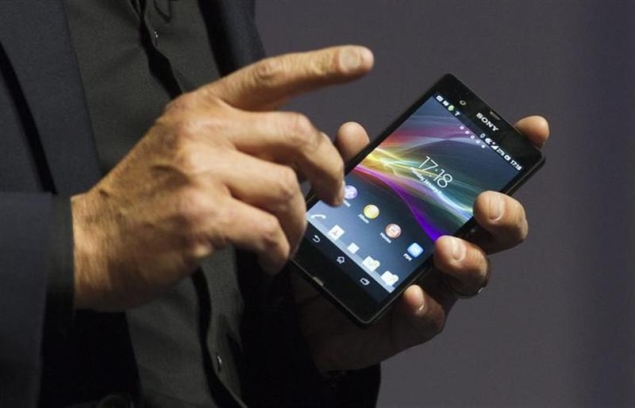- Home
- Mobiles
- Mobiles News
- Sony's plans for smartphone race may be hampered without China, US ambition
Sony's plans for smartphone race may be hampered without China, US ambition

But that goal remains some way off. Sony's CEO, installed last year with a brief to turn the serial loss maker around, said on Friday that for now, Sony has no big plans for the world's two largest smartphone markets, China and the United States.
Instead, Hirai said Sony, which aims to rise to third position from its current ranking of seventh, will focus on Europe and its home market in Japan, which collectively account for 60 percent of its smartphone sales.
"Those two are the most important areas for us and we'll put substantial resources there. But not yet for the U.S. and China," Hirai told a gathering of journalists.
"It's not realistic to try to do everything at once. In the U.S. we'll start gradually."
In the U.S., only the fourth-largest carrier T-Mobile US Inc offers Sony smartphones. Meanwhile, Sony has been unable to compete in China with homegrown brands from ZTE to CoolPad despite contracts with the three largest carriers.
Sony is not among the top five smartphone brands in either of those markets, according to research firm IDC. Its global share of the smartphone market was a modest 2.2 percent in the second quarter of this year, according to research firm Gartner, trailing the likes of LG Electronics Inc and Lenovo Group Ltd as well as Apple Inc and Samsung Electronics.
Hirai has positioned mobile devices as one of the three pillars for a turnaround of the company's electronics unit, which relied on help from a weak yen to post a profit in the latest quarter - its first quarterly profit in two years.
The other two key divisions are games, where the PlayStation 4 console due for launch next month has drawn strong pre-orders, and digital imaging, where Sony dominates the production of image sensors for smartphone cameras.
Against that background, smartphones could end up the weakest link in the strategy.
Not exceptional
"Their devices are OK but frankly not compelling. They're fine, but they're not exceptional," said Benedict Evans, an independent mobile and telecommunications analyst based in London.
"But the deeper problem is that when you're selling devices made on someone else's platform it's extremely difficult to differentiate."
Even in its home market, where Sony ranked No. 2 in the latest quarter behind Apple, the outlook has become tougher. Last month Japan's largest carrier, NTT DoCoMo Inc, which in its summer campaign favoured Sony's Xperia over other domestic brands, struck a deal with Apple to carry the latest iPhone.
Still, Hirai said the Xperia's established reputation in Japan should help to see off the threat from Apple. "We have strong brand recognition here for Xperia's hardware and services," Hirai said.
The company has set a target of selling 42 million smartphones worldwide in the financial year to next March, an increase of 27 percent from a year ago.
In 2012, Samsung shipped 218.2 million Galaxy phones while Apple sold 135.9 million iPhones, according to IDC.
© Thomson Reuters 2013
Get your daily dose of tech news, reviews, and insights, in under 80 characters on Gadgets 360 Turbo. Connect with fellow tech lovers on our Forum. Follow us on X, Facebook, WhatsApp, Threads and Google News for instant updates. Catch all the action on our YouTube channel.
Related Stories
- Samsung Galaxy Unpacked 2026
- iPhone 17 Pro Max
- ChatGPT
- iOS 26
- Laptop Under 50000
- Smartwatch Under 10000
- Apple Vision Pro
- Oneplus 12
- OnePlus Nord CE 3 Lite 5G
- iPhone 13
- Xiaomi 14 Pro
- Oppo Find N3
- Tecno Spark Go (2023)
- Realme V30
- Best Phones Under 25000
- Samsung Galaxy S24 Series
- Cryptocurrency
- iQoo 12
- Samsung Galaxy S24 Ultra
- Giottus
- Samsung Galaxy Z Flip 5
- Apple 'Scary Fast'
- Housefull 5
- GoPro Hero 12 Black Review
- Invincible Season 2
- JioGlass
- HD Ready TV
- Latest Mobile Phones
- Compare Phones
- Tecno Pova Curve 2 5G
- Lava Yuva Star 3
- Honor X6d
- OPPO K14x 5G
- Samsung Galaxy F70e 5G
- iQOO 15 Ultra
- OPPO A6v 5G
- OPPO A6i+ 5G
- Asus Vivobook 16 (M1605NAQ)
- Asus Vivobook 15 (2026)
- Brave Ark 2-in-1
- Black Shark Gaming Tablet
- boAt Chrome Iris
- HMD Watch P1
- Haier H5E Series
- Acerpure Nitro Z Series 100-inch QLED TV
- Asus ROG Ally
- Nintendo Switch Lite
- Haier 1.6 Ton 5 Star Inverter Split AC (HSU19G-MZAID5BN-INV)
- Haier 1.6 Ton 5 Star Inverter Split AC (HSU19G-MZAIM5BN-INV)






![[Partner Content] OPPO Reno15 Series: AI Portrait Camera, Popout and First Compact Reno](https://www.gadgets360.com/static/mobile/images/spacer.png)









